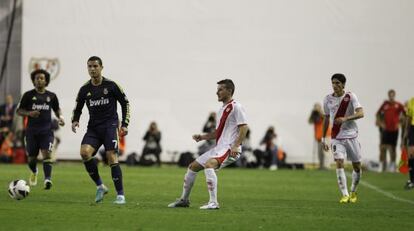Is the class war killing soccer, or is injustice what keeps the game kicking?
Clubs that have become global brands reap rich rewards while rest struggle

Sports commentators say that Real Madrid and FC Barcelona are the biggest teams in the world. This statement is based on the clubs' social relevance, financial income and on-pitch performance. Their superiority over other teams is very marked, especially with regard to members of the Spanish League. Yes, there is the occasional moment of glory for the other clubs, such as when Atlético Madrid won the UEFA Supercup, but that basically serves to remind us that other teams actually exist. The differences are getting bigger with each passing season, and the rotation of cup winners that was once the hallmark of soccer is fast disappearing.
According to Football Money League 2012, a report by Deloitte that lists the highest earning clubs in the world, between 2007 and 2011 Real Madrid's revenues went from 351 to 480 million euros, a 36-percent increase. At the same time its great rival, FC Barcelona, saw its own revenues grow by 69 percent, from 290 to 451 million euros. Between the two of them, these are revenues of over 800 million euros. This growing power is even noticeable in intangible things. Real Madrid, says the consulting firm Brand Finance, is the second most valuable brand in European soccer (477 million euros), and FC Barcelona (467 million) ranks third.
"This concentration process is not only taking place in Spain. Something similar is happening in most European leagues," says a spokesman for Spain's Professional Soccer League (LFP). In his opinion, the other teams are also benefiting from the image and advertising pull of "these two colossus."
This is one way to look at it. Other experts note that the five great competitions of the Old Continent (Germany, Spain, France, England and Italy) have a serious problem of asymmetry between their revenues (8.4 billion euros) and the sky-high salaries of their players (5.5 billion euros). That's where some of the headaches are coming from, especially in Spain.
The two big teams take the lion's share; the others take the crumbs"
"Many clubs will have to reduce the cost of their staff, since they are forced to balance income and expenses," says Félix Plaza, a partner in Sports & Entertainment, of the Garrigues law firm. This is something that the soccer representative Manuel García Quilón says is already happening in Spanish soccer in a dramatic way. He points out that Third Division players are making practically no money, while only around 20 percent of Second B Division players can make a living from the sport. And things are not looking much better in the Second Division, just one step below the elite category, since contracts have been halved and even many First Division contracts have gone down. "Only the big stars' contracts are being maintained," notes García Quilón.
The publication Futebol Finance provides an X-ray of the salaries of those "franchise players" in 2011, and despite the crisis the figures are enough to make one faint. Cristiano Ronaldo grosses a million euros a month. Fernando Torres makes 833,000 euros a month, Xavi 625,000 euros, Andrés Iniesta 583,000, David Villa 583,000 and Leo Messi 875,000.
Several players' agents participate in this distribution of wealth. The analysis firm CIES Football Observatory estimates that the intermediaries working in the UEFA zone made 400 million euros in commissions last year in connection with player operations. Gestifute is an especially sharp agency that handled transfers worth 369.8 million euros during the 2010-2011 season. Its head is Jorge Mendes, the all-powerful Portuguese agent who manages Ronaldo, Pepe, Radamel Falcao, Ángel di María and José Mourinho. The Real coach makes 10 million euros a year, according to Futebol Finance, while Pep Guardiola used to make around 7.5 million when he headed FC Barça.
But there are other, less lush sides to reality. For instance, there is UD Salamanca, a historical club founded in 1923, which nearly disappeared earlier this month, surviving only thanks to an 11th-hour contribution of between 400,000 and 500,000 euros from the Hidalgo family (owners of the tourism group Globalia), team sources confirmed. Meanwhile, the city has promised to look for a sponsor and other businesses in the area have pledged money as well. But how did things get so desperate? "The trigger was going down to Second B Division and the thoughtless spending of the late 1990s and early 2000s," recalls a club spokesman.
How can you take a grandson to a game at 11pm? If we lose tradition, it's all over"
It is a fact that this old game has two faces, one of opulence and one of need. "Soccer in Europe is in a state of crisis because of the growing gap between rich and poor clubs and because of poor management at many of them," warns Rafaelle Poli, head of the CIES Football Observatory.
As a matter of fact, some observers like to blame the crisis partly on the share-out of television rights. Real Madrid and FC Barcelona made 183 million euros each during the 2010-2011 season, according to Deloitte. "The two big teams take the lion's share, the others take the crumbs," admits a high-ranking exec at the white team.
But it is also true that both teams have the greatest capacity for generating audiences and business. In spite of everything, "if in the end we are not headed toward a European league, what we need to do is to support other clubs more," recommends Sandalio Gómez, an expert in sports management at IESE Business School.
"Very few people remember it, but Valencia and Villarreal competed in last season's Champions League with no sponsors on their shirts," notes José María Gay de Liébana, an economist at Barcelona University. "Any brand will prefer being the third sponsor of Real Madrid or Barcelona rather than the first sponsor of any other team."
However, some nuance can be added to this statement. Bolsa IG has been sponsoring Getafe for three years. This modest Madrid club has nevertheless been playing in the BBVA League, where it has had an excellent performance in the last few seasons. "We are very happy about the sponsorship. The return on investment is very high, and thanks to it we can reach a public that we would not reach with our financial publications," says Marta Izquierdo, IG's head of communications.
The thing is, despite the economic situation fans still respond to the call of soccer. Spectator turnout during the 2011-2012 season at BBVA League stadiums reached 9.9 million euros, the highest volume in the last decade. But the empty patches in plain view of late at some large stadiums point to a changing trend. Then there is the change in schedules that the LFP established this year and which has met with more or less general rejection.
"It looks like the League is not aware that soccer is a family spectacle. How can a grandfather take his grandson to watch a game at 11pm? This sport is based on tradition; if that is lost, soccer is lost!" exclaims Gay de Liébana. To this we must add the steep price of tickets. "Let's be honest," says the exec at Real Madrid. "It's very expensive for a family to pay 300 euros to go see a soccer game. That's why this has turned into a televised sport."
Despite all the setbacks, soccer has a very loyal fan base and this may well represent its greatest value as a business. Within the world of soccer, Joma is mostly known for its soccer shoes. Like any other company making consumer products, it has felt the recession, yet it continues to grow. One of its strategies is sponsorships of teams like Valencia, which increased brand visibility and pushed sales up, company sources said.
Tu suscripción se está usando en otro dispositivo
¿Quieres añadir otro usuario a tu suscripción?
Si continúas leyendo en este dispositivo, no se podrá leer en el otro.
FlechaTu suscripción se está usando en otro dispositivo y solo puedes acceder a EL PAÍS desde un dispositivo a la vez.
Si quieres compartir tu cuenta, cambia tu suscripción a la modalidad Premium, así podrás añadir otro usuario. Cada uno accederá con su propia cuenta de email, lo que os permitirá personalizar vuestra experiencia en EL PAÍS.
¿Tienes una suscripción de empresa? Accede aquí para contratar más cuentas.
En el caso de no saber quién está usando tu cuenta, te recomendamos cambiar tu contraseña aquí.
Si decides continuar compartiendo tu cuenta, este mensaje se mostrará en tu dispositivo y en el de la otra persona que está usando tu cuenta de forma indefinida, afectando a tu experiencia de lectura. Puedes consultar aquí los términos y condiciones de la suscripción digital.









































